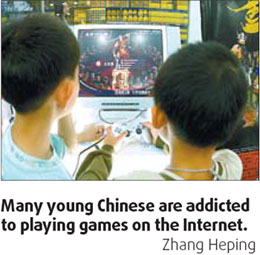China's young Internet addicts need consistent help from family, school and society to overcome their problems, according to doctors and experts at a recent conference in Beijing.
According to the China Internet Network Information Center survey, the number of young Net addicts has grown from 111 million in December, 2005 to 162 million in July, 2007.
Internet addiction disorder (IAD), or pathological Internet use (PIU), refers to a compulsive disorder without addictive substances, whose symptoms are impairment of an individual's social and psychological functions because of obsessive Internet use. Chinese psychologists have increasingly found IAD a major problem among young Chinese netizens, who ignore their family obligations and even drop out of school.
According to the China Youth Association for Network Development (CYAND), the percentage of Internet addicts among young Chinese netizens in 2007 is 3.48 percent lower than in 2005. CYAND's report is based on survey results from 11,023 people in 12 major Chinese cities, and 10,363 netizens. The survey looks at three major indices, which are IAD, the subject's sociability and the purpose of Internet use.
According to the report, the extent of Internet addiction is higher among young male Internet users, those who are jobless, and among university and vocational college students. More than 20 percent of young Net addicts indicated a breakdown in family relationships, and in relations with their teachers or fellow students.
While many young Chinese are addicted to games, or use the chat rooms, those who are not addicted use the Internet more for information, to contact friends, or as a tool for study or work. Both groups were found to be highly interested in entertainment content, although those addicted showed a high interest in role-play games and competitive computer games.
Psychiatrist Yang Yongxin from No 4 Hospital in Linyi of Shandong province, says his IAD treatment center has cured 500 people in the past four years. The center regularly houses more than 100 young Internet addicts. Treatment involves both medicines and behavioral correction, similar to that used in military training for students in Chinese universities.
Yang says the center offers more than 50 therapeutic modes for both the addicts and their parents, whose presence the doctor insists upon.
While some other IAD treatment center forbid the treated from using computers, Yang's program allows surfing the Internet, to learn of its benefits and harms, as well as its function as a cultural, entertainment and educational tool.
(China Daily February 20, 2008)


